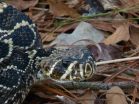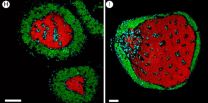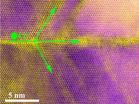(Press-News.org) PHOENIX -- Prior studies have shown that most dog bite injuries result from family dogs. A new study conducted by Mayo Clinic and Phoenix Children's Hospital shed some further light on the nature of these injuries.
The American Veterinary association has designated this week as Dog Bite Prevention Week.
The study, published last month in the Journal of Pediatric Surgery, demonstrated that more than 50 percent of the dog bites injuries treated at Phoenix Children's Hospital came from dogs belonging to an immediate family member.
The retrospective study looked at a 74-month period between 2007 and 2013 in which there were 670 dog bite injuries treated at Phoenix Children's Hospital. Of those, 282 were severe enough to require evaluation by the trauma team or transportation by ambulance. Characteristics of the most common injuries included:
Both genders were affected (55 percent male)
The most common patient age was 5 years, but spanned from 2 months to 17 years
28 dog breeds were identified and the most common dog was pit bull
More than 50 percent of the dogs belonged to the patient's immediate family
The most common injuries were lacerations (often to the face) but there were also a number of fractures and critical injuries such as severe neck and genital trauma
"More than 60 percent of the injuries we studied required an operation," said lead author Erin Garvey, MD, a surgical resident at Mayo Clinic "While the majority of patients were able to go home the next day, the psychological effects of being bitten by a dog also need to be taken into account."
"The biggest warning from this study is that familiarity with a dog may confer a false sense of safety," said Ramin Jamshidi, MD, senior author on the study and a pediatric surgeon at Phoenix Children's Hospital and Medical Director of Pediatric Trauma at Maricopa Medical Center.
"The next step is to find out what type of education is needed and for whom - the parents, owners of the dogs and even the kids themselves," explains Dr. Garvey.
"Above all, we are interested in the health of children, so we hope to educate families on the importance of following safety tips and guidelines when dealing with dogs, even the well-known family pet at home," echoes Dr. Jamshidi.
The Injury Prevention Center at Phoenix Children's Hospital works to educate patients and families in areas of safety - whether it is water safety, car seat safety or home safety - their goal is to make sure families have the tools they need to keep their children safe. When there is a family dog in the home, the Injury Prevention Center recommends families follow some of the below tips:
Never leave infants or young children alone with a dog, including the family dog
Make sure all dogs in the home are neutered or spayed
Take time to train and socialize your dogs
Keep dogs mentally stimulated by walking and exercising them
Teach children appropriate ways to interact with animals
INFORMATION:
For more information, please visit http://www.phoenixchildrens.org/health-information/children/29973/30008/30010/1,2739.
About Mayo Clinic
Mayo Clinic is a nonprofit organization committed to medical research and education, and providing expert, whole-person care to everyone who needs healing. For more information, visit http://www.mayoclinic.org/about-mayo-clinic and http://newsnetwork.mayoclinic.org/.
About Phoenix Children's Hospital
Phoenix Children's Hospital is Arizona's only children's hospital that is ranked in U.S. News & World Report's Best Children's Hospitals. Phoenix Children's provides world-class inpatient, outpatient, trauma, emergency and urgent care to children and families in Arizona and throughout the Southwest. As one of the largest children's hospitals in the country, Phoenix Children's provides care across more than 75 pediatric specialties. The Hospital is poised for continued growth in quality patient care, research and medical education. For more information about the hospital, visit http://www.phoenixchildrens.org.
MEDIA CONTACT: Jim McVeigh, Mayo Clinic Public Affairs, 480-301-4222, Email: mcveigh.jim@mayo.edu
Stacy Dillier, Phoenix Children's Hospital, 602-933-0824, sdillier@phoenixchildrens.com
The advice, whether from Shakespeare or a modern self-help guru, is common: Be true to yourself. New research suggests that this drive for authenticity -- living in accordance with our sense of self, emotions, and values -- may be so fundamental that we actually feel immoral and impure when we violate our true sense of self. This sense of impurity, in turn, may lead us to engage in cleansing or charitable behaviors as a way of clearing our conscience.
The findings are published in Psychological Science, a journal of the Association for Psychological Science.
"Our work ...
Two words that arouse immediate fear in some people inspire something else altogether in Jennifer Fill.
"I love snakes and fire," Fill says. "When I was looking at grad schools, I thought, 'if I can just combine those two things, I bet I'll be really happy.'"
It's not about cozy campfires or garden-variety garters for Fill, a biologist who recently defended her dissertation at the University of South Carolina. The fires she's interested in are forest fires, and the snake that was the subject of her doctoral studies is Crotalus adamanteus, commonly called the eastern diamondback ...
A new report on New York City's Expanded Success Initiative (ESI), which is designed to boost college and career readiness among Black and Latino male students, finds that the schools involved are changing the way they operate and offering students opportunities they would not otherwise have.
"There is strong evidence that these schools are doing something different as a result of ESI," says the study's lead author, Adriana Villavicencio, senior research associate at the Research Alliance for New York City Schools. "We are seeing important shifts in the tone and culture ...
Bacteria that live in the guts of cicadas have split into many separate but interdependent species in a strange evolutionary phenomenon that leaves them reliant on a bloated genome, a new paper by CIFAR Fellow John McCutcheon's lab (University of Montana) has found.
Cicadas subsist on tree sap, which doesn't provide them all the nutrients they need to live. Bacteria in their gut, including one called Hodgkinia, turns the sap into amino acids that sustain them during their unusual lives. Cicadas spend most of their lives underground before emerging in droves, singing loudly, ...
The sight of skilful aerial manoeuvring by flocks of Greylag geese to avoid collisions with York's Millennium Bridge intrigued mathematical biologist Dr Jamie Wood. It raised the question of how birds collectively negotiate man-made obstacles such as wind turbines which lie in their flight paths.
It led to a research project with colleagues in the Departments of Biology and Mathematics at York and scientists at the Animal and Plant Health Agency. The study found that the social structure of groups of migratory birds may have a significant effect on their vulnerability ...
Most people see defects as flaws. A few Michigan Technological University researchers, however, see them as opportunities. Twin boundaries -- which are small, symmetrical defects in materials -- may present an opportunity to improve lithium-ion batteries. The twin boundary defects act as energy highways and could help get better performance out of the batteries.
This finding, published in Nano Letters earlier this year, turns a previously held notion of material defects on its head. Reza Shahbazian-Yassar helped lead the study and holds a joint appointment at Michigan ...
May 21, 2015 -- A technique called auditory brainstem implantation can restore hearing for patients who can't benefit from cochlear implants. A team of US and Japanese experts has mapped out the surgical anatomy and approaches for auditory brainstem implantation in the June issue of Operative Neurosurgery, published on behalf of the Congress of Neurological Surgeons by Wolters Kluwer.
Dr. Albert L. Rhoton, Jr., and colleagues of University of Florida, Gainesville, and Fukuoka University, Japan, performed a series of meticulous dissections to demonstrate and illustrate ...
Water behaves in mysterious ways. Especially below zero, where it is dubbed supercooled water, before it turns into ice. Physicists have recently observed the spontaneous first steps of the ice formation process, as tiny crystal clusters as small as 15 molecules start to exhibit the recognisable structural pattern of crystalline ice. This is part of a new study, which shows that liquid water does not become completely unstable as it becomes supercooled, prior to turning into ice crystals. The team reached this conclusion by proving that an energy barrier for crystal formation ...
New research shows that infections can impair your cognitive ability measured on an IQ scale. The study is the largest of its kind to date, and it shows a clear correlation between infection levels and impaired cognition.
Anyone can suffer from an infection, for example in their stomach, urinary tract or skin. However, a new Danish study shows that a patient's distress does not necessarily end once the infection has been treated. In fact, ensuing infections can affect your cognitive ability measured by an IQ test:
"Our research shows a correlation between hospitalisation ...
This news release is available in German. FRANKFURT. In laboratory tests, two out of ten teethers, plastic toys used to sooth babies' teething ache, release endocrine disrupting chemicals. One product contains parabens, which are normally used as preservatives in cosmetics, while the second contains six so-far unidentified endocrine disruptors. The findings were reported by researchers at the Goethe University in the current issue of the Journal of Applied Toxicology.
"The good news is that most of the teethers we analyzed did not contain any endocrine disrupting ...


